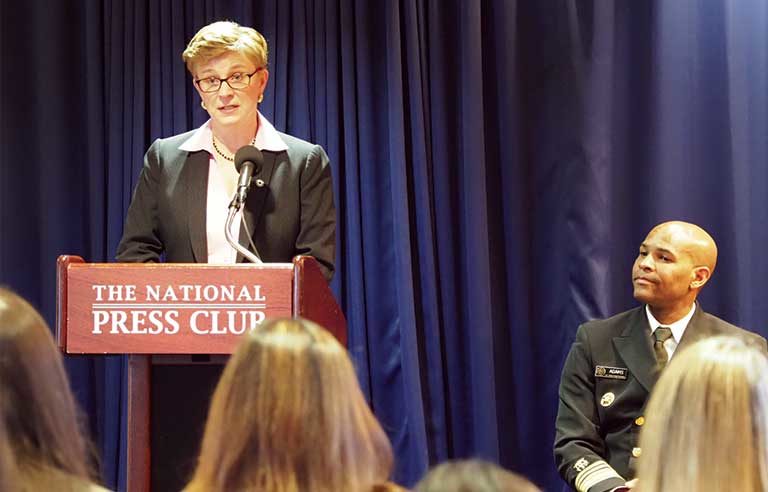‘Turn the tide’: NSC unveils employer toolkit for tackling opioid crisis

Washington — In an effort to combat the rising impact of the opioid crisis on employers, the National Safety Council has partnered with Stericycle on the Opioids at Work Employer Toolkit.
Announced Sept. 18 at the National Press Club, the toolkit offers industry-specific data, interactive web tools, videos and other information geared toward supervisors, safety professionals, human resources professionals and workers. A survey conducted in 2019 by NSC found that although opioid misuse affects 75% of employers, only 17% feel “extremely well prepared” to address the issue, findings NSC officials call a shaping influence on the toolkit.
“It’s really important that we all do our part,” NSC President and CEO Lorraine M. Martin said Sept. 9 during a toolkit preview for media at the NSC 2019 Congress & Expo in San Diego. “We’re hoping this toolkit will really help employers in the U.S. sign on and assist so we can turn the tide.”
Attendees at the Sept. 18 launch included U.S. Surgeon General Jerome M. Adams; acting OSHA administrator Loren Sweatt; Eric Talbot, assistant director of the Office of National Drug Control Policy; Carolyn Cawley, president of the U.S. Chamber of Commerce Foundation; Stericycle CEO Cindy Miller; and safety professional Rex Butler, who lost a brother to an opioid overdose.
“Employers play a critical role in solving the nation’s opioid crisis,” Adams said in a Sept. 18 press release. “The National Safety Council toolkit provides employers with a framework to effectively address employee opioid misuse and help employees get treatment if they need it.”
Added Sweatt, “We can work together to ensure safe workplaces free from opioid impairment. OSHA is proud to partner with the NSC to ensure the safety and health of America’s workers.”
In San Diego, Martin spoke alongside Joseph Reuter, executive vice president and chief people officer at Lake Forest, IL-based Stericycle. In an interview with Safety+Health, Reuter said the toolkit “fits into every company, large or small,” and encouraged employers to explore its contents, which include sample guidance for organizations interested in creating or updating a drug-free workplace policy.
“I think it will be a great benefit for them just to understand and kind of assess their own current needs of what they’re currently doing to address this situation and be transparent enough to say there are other initiatives out there, that we can do more,” Reuter said.
The toolkit is intended to help employers:
- Understand opioids and their impact on the workplace.
- Recognize signs of impairment.
- Educate workers on the risks of opioid misuse.
- Support employees who are struggling with opioid misuse or opioid use disorder.
“Workplaces … can be the place that provides that catalyst for an individual to get into a program and get into recovery and to be heard and to be seen such that the right actions can be taken,” Martin said. “So it’s really important that we provide our workplaces and professionals at all levels all the tools we need.”

